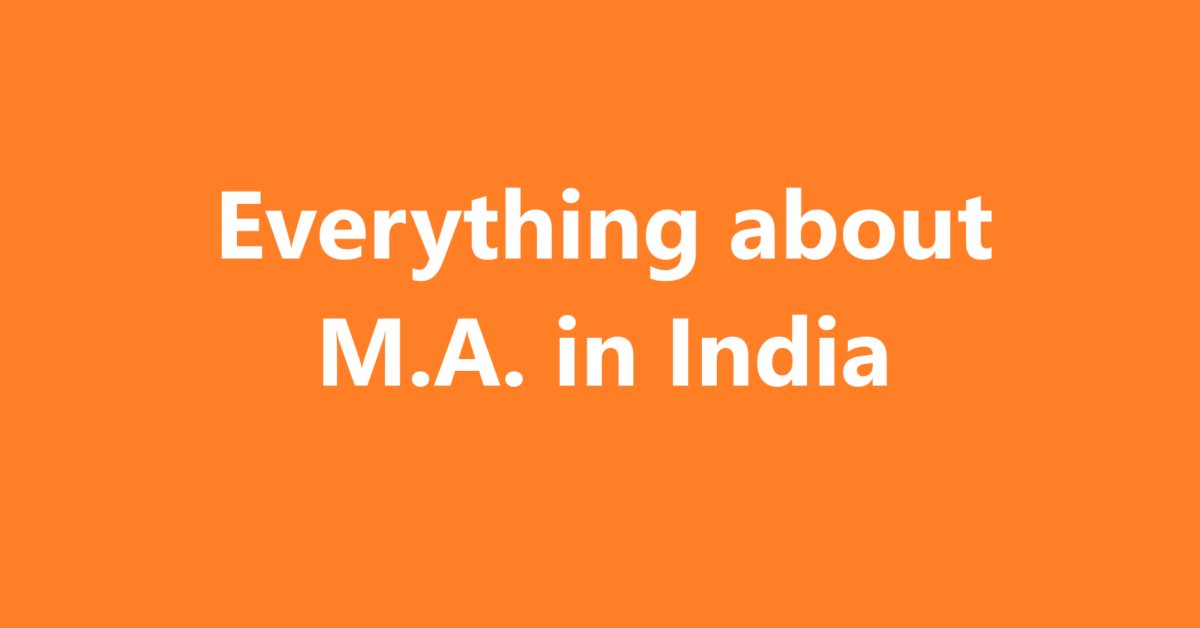Here’s a comprehensive overview of pursuing a Master of Arts (M.A.) degree in India, covering various aspects such as the program structure, specializations, admission process, career opportunities, and more.
What is M.A.?
A Master of Arts (M.A.) is a postgraduate degree that emphasizes the study of humanities, social sciences, and liberal arts. The program typically lasts for 2 years and is designed to deepen knowledge in a specific area of study while also enhancing research and analytical skills.
Specializations Offered
M.A. programs in India offer a diverse range of specializations, allowing students to explore various disciplines. Some popular specializations include:
- M.A. in English
- M.A. in History
- M.A. in Political Science
- M.A. in Sociology
- M.A. in Psychology
- M.A. in Economics
- M.A. in Geography
- M.A. in Fine Arts
- M.A. in Media Studies
- M.A. in Cultural Studies
Eligibility Criteria
- Educational Qualification: Candidates must hold a Bachelor’s degree (B.A. or equivalent) in a relevant discipline from a recognized university. Some institutions may accept graduates from related fields.
- Minimum Marks: Most universities require candidates to have a minimum aggregate percentage, typically around 50-60%, though it may vary by institution and specialization.
Admission Process
- Entrance Exams: Many universities conduct entrance exams for admission into their M.A. programs. Common entrance exams may include:
- University-specific entrance tests
- State-level entrance examinations
- National-level exams such as the UGC NET for certain subjects
- Merit-Based Admissions: Some colleges may offer admission based on the marks obtained in the qualifying Bachelor’s degree.
- Application Process: Candidates generally need to fill out an online application form for the respective universities, providing necessary documents and paying the application fee.
Curriculum and Subjects
The M.A. curriculum typically includes a mix of core subjects, electives, practical components, and research work. The structure generally consists of:
- Core Subjects: Fundamental subjects related to the chosen specialization.
- Electives: Additional courses allowing students to explore other areas of interest.
- Research Projects: In-depth research projects are often required, particularly in the final year.
Career Opportunities
Graduates of the M.A. program can pursue various career paths across multiple sectors, including:
- Higher Education:
- Pursuing a Ph.D. in their area of specialization.
- Joining professional courses like M.B.A., M.Ed., etc.
- Job Opportunities:
- Teacher or lecturer in colleges and universities (additional qualifications like B.Ed. or NET may be required)
- Research analyst or research assistant
- Content writer/editor
- Social worker or counselor
- Public relations executive
- Journalist or media professional
- Human resources executive
- Cultural or arts manager
- Government Jobs:
- Civil services (UPSC, SSC, etc.)
- Administrative positions in governmental and non-governmental organizations.
Skill Development
M.A. programs help students develop essential skills, including:
- Critical Thinking and Analytical Skills: The ability to analyze complex issues and construct reasoned arguments.
- Research Skills: Conducting independent research and presenting findings effectively.
- Communication Skills: Enhancing verbal and written communication abilities.
- Interpersonal Skills: Working collaboratively and engaging with diverse perspectives.
Here are some frequently asked questions (FAQs) about pursuing a Master of Arts (M.A.) degree in India, along with detailed answers:
FAQs About M.A. in India
1. What is the duration of an M.A. program in India?
An M.A. program typically lasts for 2 years (4 semesters), although some institutions may offer a 1-year program for certain disciplines.
2. What are the eligibility criteria for M.A. admissions?
- Candidates must have completed a Bachelor’s degree (B.A. or equivalent) from a recognized university.
- A minimum aggregate percentage of 50-60% is usually required, but this can vary by institution and specialization.
3. How can I apply for an M.A. program?
Applications can be submitted online through the respective university or college websites. The process generally involves completing an application form and submitting requisite documents.
4. Are entrance exams required for M.A. admissions?
Many universities conduct entrance exams for M.A. programs, but this varies by institution. Common entrance exams include:
- University-specific entrance tests
- State-level exams
- National exams like UGC NET for certain subjects
5. What specializations are available in M.A. programs?
Common specializations include:
- M.A. in English
- M.A. in History
- M.A. in Political Science
- M.A. in Sociology
- M.A. in Psychology
- M.A. in Economics
- M.A. in Geography
- M.A. in Fine Arts
- M.A. in Media Studies
6. What subjects are covered in an M.A. program?
The curriculum typically includes:
- Core Subjects: Major topics relevant to the chosen field.
- Electives: Additional courses for broader exploration.
- Research Projects: Often required, especially in the final year.
7. What career opportunities are available after completing an M.A.?
Graduates can pursue various career paths such as:
- Teaching or lecturing (may require additional qualifications)
- Research analyst or research assistant
- Content writer/editor
- Social worker or counselor
- Public relations executive
- Journalist or media professional
- Human resources executive
- Positions in NGOs or governmental organizations
8. Is it necessary to have a specified undergraduate degree for all M.A. specializations?
Generally, candidates should have a relevant undergraduate degree; however, some interdisciplinary programs may accept students from diverse academic backgrounds.
9. Can I pursue a Ph.D. after completing an M.A.?
Yes, an M.A. degree qualifies you for admission to Ph.D. programs in related fields, provided you meet the specific requirements of the institution.
10. What skills are developed during an M.A. program?
Students develop skills such as:
- Critical thinking and analytical reasoning
- Research and presentation abilities
- Strong written and verbal communication
- Interpersonal skills and teamwork capabilities
11. Are internships or practical experiences included in an M.A. program?
Some M.A. programs incorporate internships, fieldwork, or practical assignments to provide students with real-world experience and practical application of their studies.
12. Is there an age limit for pursuing an M.A. degree?
Generally, there is no specific age limit for enrolling in M.A. programs, but individual institutions may have their own guidelines.
13. What are the financial costs involved in pursuing an M.A.?
Tuition fees for M.A. programs can vary significantly, ranging from ₹20,000 to ₹1,50,000 per year depending on the institution. Scholarships and financial aid options may be available.
14. How should I prepare for entrance exams for M.A. programs?
Effective preparation involves:
- Reviewing the syllabus and key topics relevant to the subject.
- Practicing previous years’ question papers.
- Taking mock tests to familiarize yourself with the exam format.
Conclusion
An M.A. degree in India provides a solid foundation for various advanced careers, emphasizing critical thinking, research capabilities, and communication skills. It is a versatile degree that can lead to numerous opportunities in academia, industry, and public service.


